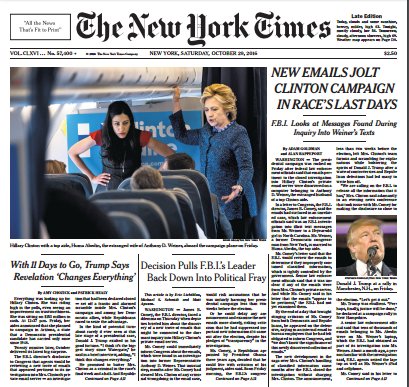I don’t want to get into the tiresome debate about whether or not the Comey letter was decisive. It was, as even Trump’s own analysts agree. Sure, Clinton might have run populist ads in the Rust Belt or spent her final days in Wisconsin, and it might have changed history. And certainly Comey could have followed the rules and kept his mouth shut. There have been millions of words written about both of those counterfactuals but very little, so far, about the mainstream media’s contribution to the unexpected election outcome.
With the benefit of hindsight it’s clear that the endless hand-wringing over Clinton’s emails was overblown, especially since we now know that the entire U.S. intelligence apparatus was on high alert over potential collusion between a foreign government and the Trump campaign. But like Comey, the editors of the New York Times apparently also believed that Clinton couldn’t lose. And that led to this collaboration between the FBI and the New York Times that changed the world:
It’s a fairly open-and-shut case. But the media’s election post-mortems have mostly ignored it because it implicates the media’s judgement. pic.twitter.com/cBLifP9WLu
— Nate Silver (@NateSilver538) April 22, 2017
The media and the FBI are clearly not going to admit their complicity in the events that led to Trump’s upset victory so that’s a judgment that will have to be left to the historians. But it does raise the question of how these relationships will be handled going forward.
We have no idea where the FBI investigation of the Russian hacking of the campaign and its possible connections to Trump is going. We will have to wait and see. But we can judge the relationship between Trump and the press right now — and it’s not what it appears to be.
According to the Washington Post, Trump sees the presidency as a performance and he spends most of his time watching himself on TV and checking his reviews:
For Trump — a reality TV star who parlayed his blustery-yet-knowing on-air persona into a winning political brand — television is often the guiding force of his day, both weapon and scalpel, megaphone and news feed. And the president’s obsession with the tube — as a governing tool, a metric for staff evaluation, and a two-way conduit with lawmakers and aides — has upended the traditional rhythms of the White House, influencing many spheres, including policy, his burgeoning relationship with Congress, and whether he taps out a late-night or early-morning tweet.
We knew that he watched TV obsessively during the campaign. But one might have expected that he would be too busy with the actual job of being president to keep it up once he was in the White House. He not only watches it in the early morning and all evening late into the night, but he checks in periodically during the day, sometime interrupting meetings to focus on what’s being said about him. And from the description of his habits, it’s not a matter of trying to manipulate the politics of the day or strategically influence other political players through the media. He’s just judging the public performances of his staff and seeing how he is personally being portrayed. That’s all he cares about
In a disturbing interview with the Associated Press on Friday, Trump seemed to indicate that he literally assesses his own success as president by the ratings he gets on television:
No I have, it’s interesting, I have, seem to get very high ratings. I definitely. You know, Chris Wallace had 9.2 million people, it’s the highest in the history of the show. I have all the ratings for all those morning shows. When I go, they go double, triple. Chris Wallace, look back during the Army-Navy football game, I did his show that morning … It had 9.2 million people. It’s the highest they’ve ever had. On any, on air, (CBS “Face the Nation” host John) Dickerson had 5.2 million people. It’s the highest for “Face the Nation” or as I call it, “Deface the Nation.” It’s the highest for “Deface the Nation” since the World Trade Center. Since the World Trade Center came down. It’s a tremendous advantage.
The president of the United States actually compared his TV ratings to 9/11.
The image we have of Trump and the media is of an abusive relationship in which Trump continuously insults the press but they are forced to endure his scorn and disrespect because it is their job to cover him. But it’s really more like a phony wrestling match or a reality TV contest.
Politico also featured an article this weekend about Trump’s press operation and the media, and in this telling the relationship is not so much hostile as simply chaotic. This is mostly because nobody on Trump’s team knows what they’re doing and the entire administration is hard-wired to lie about everything, even if they are doing it simply for the fun of it, which they admit they do. It’s a profile of an organization that is dysfunctional on every level. And this is supposed to be the one area in which Trump is an expert.
A couple of major polls came out this weekend showing that Trump’s first hundred days have been disastrous. His base is still with him, but he’s lost independents and even many Republicans seem shaky. There was one decision that a solid majority supported: the Syrian airstrikes. That is very bad news. Trump reads polls as obsessively as he watches himself on TV, and he undoubtedly noticed that people liked him dropping bombs. For that we can thank the media as well. They were very excited about his “presidential” decision and conveyed that to their audience.
We’ve seen that reality show before too. It led us into the Iraq war, and the mainstream media has never fully accounted for themselves for their role in that disaster either. It’s not a good sign.

